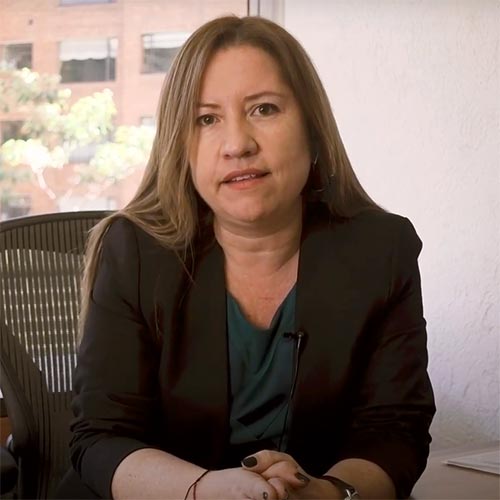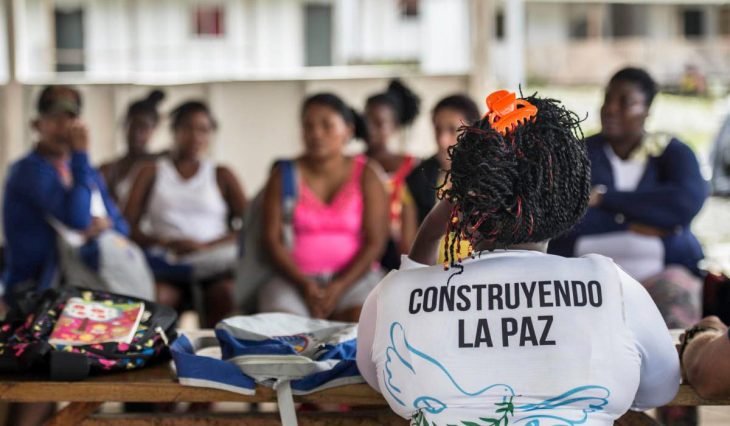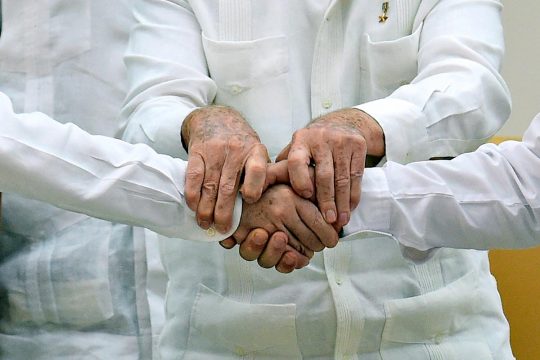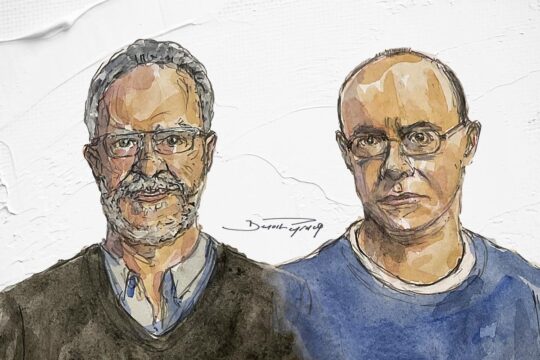In her book “The danger of a single story”, Nigerian writer Chimamanda Ngozi Adichie said in 2018 that the voices of people who have been systematically oppressed should be given precedence over those who have historically narrated the history of any conflict. For the author, having a single narrative of the past deprives people of their dignity and hinders the recognition of others, thus undermining a sense of shared humanity.
Peace talks offer important opportunities to change this dynamic. They can create space for new narratives, especially when they help make the voice of victims visible. This can build a sense of dignity for the victims, ensure any peace deal is informed by the realities of the local context, contribute to the legitimacy of the process, facilitate bridge building between elite and community level concerns – all of which contributes to more sustainable peace.
Victims' participation in the process of building legal frameworks for peace is no different.
The Peace Treaty Initiative is a new global project that aims to fill this critical gap, by introducing an international legal instrument that would create incentives for state and non-state actors to privilege dialogue over confrontation. But while developing a legal framework to promote and protect peace negotiations is an honourable and necessary undertaking, the way it is established is as relevant as the final content of the legal text itself.
Victims’ participation in Colombia’s peace talks
The Colombian peace process may serve to illustrate the relevance of including victims’ voices, as well as to provide creative ideas on how to achieve meaningful participation without endangering the bigger goal: whether it be to achieve peace, or in this case, to ensure the creation of a new international law of peace negotiation.
From the early phases of Colombia’s peace talks in Havana, several mechanisms were established to give voice to victims and to citizens more generally. This included visits to Havana, encompassing special delegations of women’s groups and by 60 individual victims of the armed conflict who addressed the parties over the course of five successive visits, each one comprised of 12 victims. The process also included major regional and thematic summits and forums held in Colombia, as well as a procedure through which, physically or electronically, any citizen or group could submit proposals to the negotiating parties. By the end of the talks, about 67,000 proposals (addressing different agenda items) reached the delegations.
At the victim hearings in particular, the parties were able to hear victims’ key concerns, reflections and proposals. This not only allowed for the recognition of these groups and communities – including their history and the ongoing risks they faced as a result of the continued violence – but also directly contributed to shaping the transitional justice framework that was ultimately agreed.
The voice of specific communities
The Colombian process also provides lessons about the participation of specific communities such as women and ethnic groups, which require an approach that is in sync with their customs and traditions. When they were not initially included in the negotiations, indigenous and Afro-Colombian organisations advocated for their own participation, ultimately succeeding in the creation of an influential Ethnic Commission. Jesús Chávez, indigenous leader and senior advisor to one of the most important platforms of indigenous peoples in Colombia, said of the process: "The time when others spoke for us is over; today what we express is that feeling of collective peacebuilding, which allows us to recognise and understand each other in [our] diversity and build a true social fabric".
Meaningful participation by victims, women, rural workers, ethnic groups, human rights defenders, and young people made the difference. It ultimately helped bring about peace and improve the content of the final agreement, including in the period of its re-negotiation after the deal was narrowly rejected in a plebiscite.
Getting legitimacy at the local level
The value of participation by victims and survivors is not limited to local peacemaking but extends to global lawmaking and policymaking. The International Campaign to Ban Landmines is a good example. Led by Jody Williams jointly with the Vietnam Veterans of America Foundation (VVAF) and the German organisation Medico International (MI), the campaign engineered an international Mine Ban Treaty prohibiting landmines through a bottom-up approach. From the start, leading NGOs took ownership of the process at all levels (sub-national, national, international) and it wasn’t until later that governments started supporting the initiative. Legitimacy at the local level was key for the success of this global goal.
Beyond the sphere of peacebuilding, the UN High Level Panel on Internal Displacement is another good example. In this case, due to Covid-19, the Panel was unable to travel and meet as it had initially foreseen and faced several challenges connecting victims – who still now, more often than not, live in marginal areas with limited access to technology. Working through its partners, the Panel consulted thousands of internally displaced persons in 22 countries and received hundreds of written submissions. The recommendations included in its final report reflect the main comments gathered via the participation process, leading to a very positive reception internationally, nationally and locally within the participating countries.
No one understands the consequences of war more than its victims
In the words of Francia Márquez, emblematic leader for the Afro-Colombian population: "It is in the courtyard of our houses that the fighting has taken place; it is on our rooves that the bombings have taken place; it is in the sowing of our subsistence cropsthat the landmines have been planted. It is our territories that have been invaded with coca and then poisoned with glyphosate; it is our markets that have been attacked by the armed actors; it is our sons, brothers, cousins and nephews that have been recruited and killed by one side or the other; it is our daughters, nieces, sisters, aunts and cousins who were sexually abused, prostituted, enslaved and murdered; it is our rivers that became cemeteries; it is our families and neighbours who had to flee the territory where they were born; and it is our freedoms that ceased to exist, imposed by others”.
These words, which could have been expressed by victims in just about any armed conflict in the world, underscore how much the world needs more peace. The simple truth is that no one understands the consequences of war more than its victims.
The value of a global consultation process
The global consultation process for the Peace Treaty Initiative presents an important opening to build on the lessons described above as regards the value of incorporating victim voices and participation – something that appears to be embedded in the very design of the process.
Ensuring the meaningful participation of conflict-affected societies and of organisations of victims and survivors represents a win-win opportunity. By making use of different tools and spaces, the global consultation process can build upon valuable precedents of victim participation, ensuring both a better final text for the treaty and a greater baseline of public legitimacy which could then serve as positive leverage for reaching the ultimate goal of widespread state ratification.
For this to happen, it is important to think of participation through the broad lens of inclusivity, ensuring diverse forms of input and voice, both in writing and in person. In addition, especially in the context of the pandemic, building alliances with ground-level or intermediary-level leaders and organisations will prove vital as they can help connect community-level actors with this global initiative – thus ensuring meaningful grassroots participation.
Incorporating follow-up mechanisms that allow constituencies to see the evolution and impact of the consultation process would further help to bolster the legitimacy of the whole initiative.
The potential benefits are countless, and include the symbolic value of the proposed treaty and its real potential to address the needs of conflict-affected societies, build on good practices in the field, give legitimacy to the choice of dialogue, and engage political will at the highest levels to commit to a rights-based order that puts humanity first.

Paula Gaviria Betancur is the executive director of Colombia’s Compaz Foundation. She is a lawyer and journalism specialist, with postgraduate degrees in public opinion and political marketing. She is a former member of the United Nations Secretary-General’s High-Level Panel on Internal Displacement, the former Presidential Advisor for Human Rights in Colombia and former director of the national victims’ reparations agency. Paula Gaviria was actively involved in the drafting of the victims’ chapter of the Final Peace Agreement signed between the Colombian government and the FARC-EP, where she advocated the inclusion of victims’ voices in the process.







